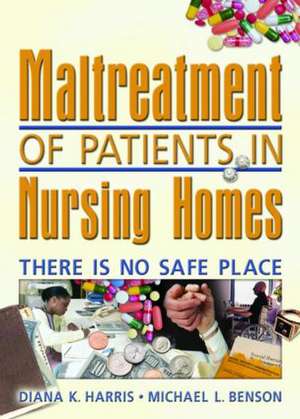Maltreatment of Patients in Nursing Homes: There Is No Safe Place
Autor Diana Harris, Harold G Koenigen Limba Engleză Hardback – 15 dec 2005
Old, weak, and often cognitively impaired, nursing home patients can be easy targets for physical, psychological, material, and financial mistreatment at the hands of those entrusted with their care, safety, and well-being. Maltreatment of Patients in Nursing Homes: There Is No Safe Place examines the dark side of nursing homes, where not every employee has the commitment of Mother Theresa. This groundbreaking book applies criminological theory to help develop practical methods of controlling abuse and presents the results of the first and only nationwide study on the theft of patients’ belongings, a form of abuse too often ignored by the nursing home industry.
Maltreatment of Patients in Nursing Homes surveys employees, administrators, and family members of patients in 47 nursing homes throughout the United States. Their responses provide invaluable insights on a wide range of topics, including the social and psychological factors that cause different types of abuse, characteristics of nursing home patients and employees, the bureaucracy of nursing homes, victimization rates, workforce issues of nursing home aides, and federal regulations for nursing homes. The information gained from the surveys forms the basis for detailed recommendations for creating a safer environment and reducing all forms of abuse, including theft-prevention training programs, background checks and improved screening of potential employees, education and advocacy for current staff, and the reform of federal regulations.
Maltreatment of Patients in Nursing Homes examines:
- types of physical abuse (restraints, sexual abuse, neglect)
- the who, what, and why of nursing home theft
- types of financial abuse (trust accounts, bank accounts, improper charges for services and drugs, identity theft)
- types of psychological abuse (abandonment, segregation, childlike treatment, verbal abuse)
- effects of psychological abuse (depression, learned helplessness, psychiatric disorders)
- reasons for abuse by employees (staff turnover, job burnout, job dissatisfaction, caregiver stress)
Preț: 1212.47 lei
Preț vechi: 1479.22 lei
-18% Nou
Puncte Express: 1819
Preț estimativ în valută:
232.01€ • 242.73$ • 192.73£
232.01€ • 242.73$ • 192.73£
Comandă specială
Livrare economică 13-27 martie
Doresc să fiu notificat când acest titlu va fi disponibil:
Se trimite...
Preluare comenzi: 021 569.72.76
Specificații
ISBN-13: 9780789023254
ISBN-10: 0789023253
Pagini: 156
Dimensiuni: 148 x 210 x 16 mm
Greutate: 0.42 kg
Ediția:New.
Editura: Taylor & Francis
Colecția Routledge
Locul publicării:Oxford, United Kingdom
ISBN-10: 0789023253
Pagini: 156
Dimensiuni: 148 x 210 x 16 mm
Greutate: 0.42 kg
Ediția:New.
Editura: Taylor & Francis
Colecția Routledge
Locul publicării:Oxford, United Kingdom
Cuprins
- Preface
- PART I: NURSING HOMES AND THEORIES OF ABUSE
- Chapter 1. The Nature of Nursing Homes
- Myths and Facts About Nursing Homes
- How Nursing Homes Got Started
- Nursing Homes As Bureaucracies
- Nursing Homes As Total Institutions
- Barriers to Nursing Home Abuse Research
- Chapter 2. Nursing Aides: The Backbone of Care in Nursing Homes
- Workforce Issues and Problems of Nursing Home Aides
- Narratives of Nursing Home Aides
- Chapter 3. Understanding Abuse
- Why Nursing Homes May Be Good for Abusers
- Nursing Homes and the Motivated Offender
- Patients and Their Possessions As Suitable Targets
- Guardianship in Nursing Homes
- Countervailing Forces
- Summary
- PART II: NURSING HOME THEFT
- Chapter 4. Employees and Theft
- Results from the Survey of Employees
- Conclusions About Employees
- Chapter 5. The Victims and Their Families
- Family Members’ Reports of Theft
- What Is Stolen?
- Conclusion
- Chapter 6. Preventing and Reducing Theft
- Theft Precautions for Patients
- Theft Precautions for Nursing Homes
- Reporting of Theft
- Theft Prevention Training Programs
- PART III: PHYSICAL AND MENTAL MALTREATMENT
- Chapter 7. Physical Abuse and Neglect
- Abandonment, Segregation, and Neglect
- Government Reform Committee
- Types of Physical Abuse
- Sexual Abuse
- Neglect
- Chapter 8. Psychological Abuse and Neglect
- Types of Psychological Abuse
- Some Effects of Psychological Abuse
- Neglect
- Chapter 9. Reducing the Risk of Physical and Psychological Abuse
- Screening Practices
- Staff Education and Training
- Advocacy
- PART IV: FRAUD, REFORM, AND RECOMMENDATIONS
- Chapter 10. Exploitation of Nursing Home Patients: Their Finances and Rights
- Financial Abuse
- Reform of Nursing Home Regulations
- Chapter 11. Summary and Conclusions
- Appendix. Methodology
- Data Collection
- Employee Questionnaires
- Measuring Theft
- Response Rates from the Survey of Employees
- Victimization Survey
- Family Members’ Questionnaire
- Glossary
- References
- Index
Notă biografică
Diana K. Harris, Michael L. Benson
Descriere
Old, weak, and often cognitively impaired, nursing home patients can be easy targets for physical, psychological, material, and financial mistreatment at the hands of those entrusted with their care, safety, and well-being. Maltreatment of Patients in Nursing Homes: There Is No Safe Place examines the dark side of nursing homes, where not every employee has the commitment of Mother Theresa. This groundbreaking book applies criminological theory to help develop practical methods of controlling abuse and presents the results of the first and only nationwide study on the theft of patients' belongings, a form of abuse too often ignored by the nursing home industry.
